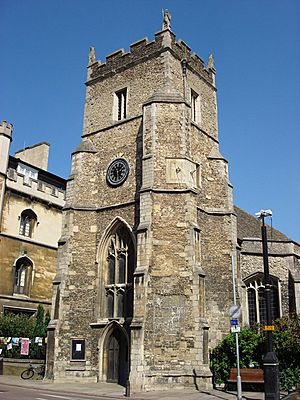St Botolph's Church, Cambridge facts for kids
Quick facts for kids St Botolph's Church, Cambridge |
|
|---|---|

St Botolph's Church tower
|
|
| 52°12′09″N 0°07′05″E / 52.2025°N 0.1181°E | |
| Location | Trumpington Street, Cambridge, Cambridgeshire, CB2 1RG |
| Country | England |
| Denomination | Church of England |
| Churchmanship | Book of Common Prayer |
| History | |
| Status | Active |
| Dedication | Botolph |
| Architecture | |
| Functional status | Parish church |
| Heritage designation | Grade I listed |
| Specifications | |
| Bells | 4 |
| Tenor bell weight | 8.5cwt in A (~430kg) |
| Administration | |
| Parish | St Botolph, Cambridge |
| Deanery | Cambridge South Deanery |
| Archdeaconry | Archdeaconry of Cambridge |
| Diocese | Diocese of Ely |
St Botolph's Church, Cambridge is a special old church in Cambridge, England. It's part of the Church of England and is considered a very important historical building. This church is a Grade I listed building, which means it's protected because of its history and beauty.
Contents
A Look Back in Time
Why the Name St Botolph?
The church is named after Botolph, a saint from the 600s. He was an abbot, which is a leader of a monastery, in a place called East Anglia. Saint Botolph is known as a patron saint for people who travel. This church was built near the old south gate of medieval Cambridge. This was where travelers coming from the south and west would enter the town.
Building the Church

Most of the church you see today was built in the 1300s. It's made from flint and rubble, with special Barnack stone used for details. Inside, there's an octagonal (eight-sided) font from 1637. A font is a basin used for baptisms. This one has a beautiful wooden cover.
The Church Tower and Bells
The church's tower was added in the 1400s. On top of the tower, there are stone figures. These figures represent the four evangelists, who wrote parts of the Bible. They were repaired in 1971. You can also spot a sundial on one of the tower's supports. The church has four bells that were made in 1460, and they are still used today!
The Chancel and Rood Screen
The chancel is the part of the church where the altar is. It was rebuilt in 1872 by a famous Victorian architect named George Frederick Bodley. Local artists helped with the detailed decorations. This area shows off amazing Victorian art and was carefully restored in 2008. The church also has the only medieval rood screen left in a Cambridge parish church. A rood screen is a decorated screen that separates the chancel from the main part of the church. Its paintings were added in the late 1800s.
Remembering Heroes
The South Chapel in the church was updated to remember those who died in the First World War. A special stained glass window in this chapel was made by Rachel de Montmorency. It shows Saint George and Saint Michael. The chapel also remembers the First Eastern General Hospital. This hospital was built when the First World War started, on the land where the Cambridge University Library is now.
Important People Remembered
Inside the church, there are memorials for several important people. These include Thomas Playfere, who was a professor in 1609, and James Essex, an architect. Members of the Darwin family, including relatives of the famous scientist Charles Darwin, are also remembered here. Sir Ernest Barker, a well-known political scientist, also has a memorial.
A Damaged Window
Sadly, in early 2020, the church was broken into. A stained glass window from 1870 was destroyed. This window was made by Charles Eamer Kempe and showed Saint Botolph and Saint Margaret of Antioch. People quickly raised money online to fix the window and make the church safer. This also helped repair the church's roof, which had been damaged by thieves a few months before.
St Botolph's Today
The church is located where Trumpington Street and Silver Street meet. A small lane called Botolph Lane runs next to the churchyard. Corpus Christi College, Cambridge is just north of the church. The church's parish area stretches west, crossing the River Cam, and includes parts of Newnham and several colleges.
Images for kids
-
The Laudian font
 | James Van Der Zee |
 | Alma Thomas |
 | Ellis Wilson |
 | Margaret Taylor-Burroughs |






